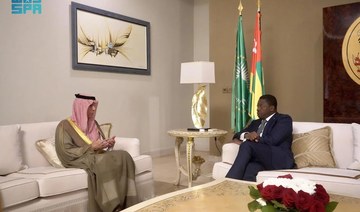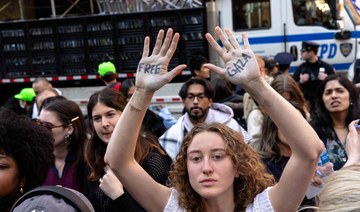LONDON: Britain on Friday ended almost half a century of European Union membership, making a historic exit after years of bitter arguments to chart its own uncertain path in the world.
There were celebrations and tears across the country as the EU’s often reluctant member became the first to leave an organization set up to forge unity among nations after the horrors of World War II.
Thousands of people waving Union Jack flags packed London’s Parliament Square to mark the moment of Brexit at 11 p.m. (2300 GMT) — midnight in Brussels.
“We did it!” declared Nigel Farage, the former member of the European Parliament who has campaigned for Brexit for years, before the crowd began singing the national anthem.
It was a largely good-natured gathering, aside from one Brexit supporter who earlier set an EU flag alight.
But Brexit has exposed deep divisions in British society, and many fear the consequences of ending 47 years of ties with their nearest neighbors.
Some pro-Europeans, including many of the 3.6 million EU citizens who made their lives in Britain, marked the occasion with solemn candlelit vigils.
Brexit has also provoked soul-searching in the EU about its own future after losing 66 million people, a global diplomatic big-hitter and the clout of the City of London financial center.
In an address to the nation, Prime Minister Boris Johnson — a figurehead in the seismic 2016 referendum vote for Brexit — acknowledged there might be “bumps in the road ahead.”
But he said Britain could make it a “stunning success.”
As he held a private party in his Downing Street office, a clock projected on the walls outside counted down the minutes until Brexit.
Johnson predicted a “new era of friendly cooperation” with the EU while Britain takes a greater role on the world stage.
“The most important thing to say tonight is that this is not an end but a beginning,” he said in a televised address.
EU institutions earlier began removing Britain’s red, white and blue flags in Brussels ahead of a divorce that German Chancellor Angela Merkel called a “sea-change” for the bloc.
French President Emmanuel Macron described it as a “historic warning sign” that should force the EU and its remaining nations of more than 440 million people to stop and reflect.
Britain’s departure was sealed in an emotional vote in the EU parliament this week that ended with MEPs singing “Auld Lang Syne,” a traditional Scottish song of farewell.
Almost nothing will change straight away, because of an 11-month transition period negotiated as part of the exit deal.
Britons will be able to work in and trade freely with EU nations until December 31, and vice versa, although the UK will no longer be represented in the bloc’s institutions.
But legally, Britain is out.
And while the divorce terms have been agreed, Britain must still strike a deal on future relations with the EU, its largest trading partner.
Both will set out their negotiating positions Monday.
“We want to have the best possible relationship with the United Kingdom, but it will never be as good as membership,” European Commission president Ursula von der Leyen said in Brussels.
Getting this far has been a traumatic process.
Britain resisted many EU projects over the years, refusing to join the single currency or the Schengen open travel area, and euroskeptics have long complained about Brussels bureaucracy.
Worries about mass migration added further fuel to the Brexit campaign while for some, the 2016 vote was a chance to punish the government for years of cuts to public spending.
But the result was still a huge shock.
It unleashed political chaos, sparking years of toxic arguments that paralyzed parliament and forced the resignations of prime ministers David Cameron and Theresa May.
Johnson brought an end to the turmoil a decisive election victory in December which gave him the parliamentary majority he needed to ratify his Brexit deal.
But Britons remain as divided as they were nearly four years ago, when 52 percent voted to leave and 48 percent voted to remain in the EU.
“Rise and shine... It’s a glorious new Britain” said the Brexit-supporting Daily Express. The i newspaper, in contrast, headlined: “What next?“
In Scotland, where a majority voted to stay in 2016, Brexit has revived calls for independence.
First Minister Nicola Sturgeon tweeted: “Scotland will return to the heart of Europe as an independent country — #LeaveALightOnForScotland.”
In Northern Ireland — soon to be the new EU frontier — there are fears Brexit could destabilize a hard-won peace after decades of conflict over British rule.
Irish foreign minister Simon Coveney tweeted: “Goodbye & good luck.”
Johnson, a polarizing figure accused of glossing over the complexity of leaving the EU, made no public appearance on Friday and avoided any official celebrations that might exacerbate divisions.
He hosted a special cabinet meeting in the northeastern city of Sunderland, which was the first to declare for Brexit in 2016, while Downing Street was lit up in the colors of the Union Jack flag.
Millions of commemorative 50 pence coins have also been issued.
It was a different story in nearby Parliament Square, where the moment of Brexit was met with cheers, the lighting of flares and balloons let off into the night sky.
“What happens now marks the point of no return. Once we have left, we are never, ever going back,” Farage told the crowd of cheering supporters.
At a “Big Brexit Bash” in Morley, northern England, Raymond Stott described the four years since the referendum as “a right cock-up.”
“I am just glad it’s all over. We will look after ourselves. We don’t need Europe,” said the 66-year-old.
Some British expatriates in southern Spain celebrated in bars but for many pro-Europeans, Friday marks a day they hoped would never come.
“Today is a day of mourning,” said Katrina Graham, 31, an Irish women’s rights activist who lives in Brussels, at a protest in central London.
At Berlin’s Brandenburg Gate, a flashmob sang the EU anthem “Ode to Joy,” from Beethoven’s ninth symphony and waved flags.
From Saturday, Britain will be free to strike trade deals around the world, including with the United States.
Johnson has given himself just 11 months to negotiate a new partnership with the EU, covering everything from trade to security cooperation — despite warnings this is not enough time.
He also discussed with his ministers on Friday an aim to get 80 percent of Britain’s commerce covered by free trade agreements within three years, a spokesman said.
US President Donald Trump is an enthusiastic supporter of Brexit, and one of his top envoys on Friday hailed an “exciting new era.”
“We will continue building upon our strong, productive, and prosperous relationship with the UK as they enter this next chapter,” Secretary of State Mike Pompeo said.
New era for divided Britain as it leaves EU
https://arab.news/jzghs
New era for divided Britain as it leaves EU

- UK will slip away from bloc an hour before midnight from club it joined in 1973
- At a stroke, the EU will be deprived of 15 percent of its economy, its biggest military spender and the world’s international financial capital of London
Togo ruling party wins sweeping majority in legislative poll, final provisional results show
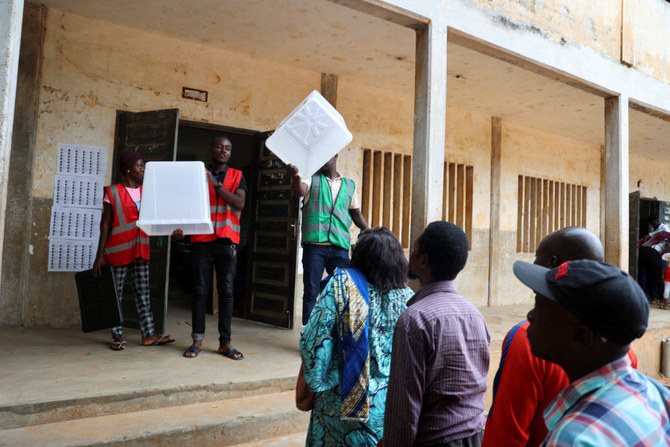
- The UNIR party's victory follows the approval of controversial constitutional reforms that could extend President Gnassingbe's 19-year rule
- Under the new charter, the president will be elected by parliament instead of by universal suffrage
LOME: Togo’s ruling party has won 108 out of 113 seats in parliament, according to the final provisional results of last month’s legislative election announced on Friday.
The sweeping majority secured by President Faure Gnassingbe’s UNIR party follows the approval of controversial constitutional reforms by the outgoing parliament that could extend his 19-year rule.
The new charter adopted in March also introduced a parliamentary system of government, meaning the president will be elected by parliament instead of by universal suffrage.
Opposition parties were hoping to gain seats in the April 29 vote to enable them to challenge the UNIR party after they boycotted the last legislative poll and left it effectively in control of parliament.
The election had been delayed twice because of a backlash from some opposition parties who called the constitutional changes a maneuver to allow Gnassingbe to rule for life.
Constitutional amendments unanimously approved in a second parliamentary vote earlier in April shortened presidential terms to four years from five with a two-term limit.
This does not take into account the time already spent in office, which could enable Gnassingbe to stay in power until 2033 if he is re-elected when his mandate expires in 2025.
Anti-war protest ruffles University of Michigan as demonstrations collide with graduation season

- Israel has killed more than 34,000 Palestinians, according to Gaza’s Health Ministry
- Tent encampments of protesters calling on universities to stop doing business with Israel or companies they say support the war in Gaza have spread across campuses nationwide in recent weeks in a student movement unlike any other this century
NEW YORK: Protesters chanted anti-war messages and waved Palestinian flags during the University of Michigan’s commencement Saturday, as student demonstrations against the Israel-Hamas war collided with the annual pomp-and-circumstance of graduation season at American universities.
The protest happened at the beginning of the event at Michigan Stadium in Ann Arbor. About 75 people, many wearing traditional Arabic keffiyeh along with their graduation caps, marched up the main aisle toward the graduation stage.
They chanted “Regents, regents, you can’t hide! You are funding genocide!” while holding signs, including one that read: “No universities left in Gaza.”
Overhead, planes flew competing messages. One read: “Divest from Israel now! Free Palestine!” The other read: “We stand with Israel. Jewish lives matter.”
Officials said no one was arrested, and the protest didn’t seriously interrupt the nearly two-hour event, which was attended by tens of thousands of people, some of them waving Israeli flags.
State police prevented the demonstrators from reaching the stage and university spokesperson Colleen Mastony said public safety personnel escorted the protesters to the rear of the stadium, where they remained through the conclusion of the event.
“Peaceful protests like this have taken place at U-M commencement ceremonies for decades,” she added.
US Navy Secretary Carlos Del Toro paused a few times during his remarks, saying at one point, “Ladies and gentlemen, if you can please draw your attention back to the podium.”
Before he administered an oath to graduates in the armed forces, Del Toro said they would “protect the freedoms that we so cherish,” including the “right to protest peacefully.”
The university has allowed protesters to set up an encampment on campus but police assisted in breaking up a large gathering at a graduation-related event Friday night, and one person was arrested.
Michigan was among the schools bracing for protests during its commencement ceremonies this weekend, including Indiana University, Ohio State University and Northeastern University in Boston. Many more are slated in the coming weeks.
At Indiana University, protesters were urging supporters to wear their keffiyehs and walk out during remarks by President Pamela Whitten on Saturday evening. The campus in Bloomington, Indiana, has designated a protest zone outside Memorial Stadium, where the ceremony is set to take place.
Tent encampments of protesters calling on universities to stop doing business with Israel or companies they say support the war in Gaza have spread across campuses nationwide in recent weeks in a student movement unlike any other this century. Some schools have reached agreements with the protesters to end the demonstrations and reduce the possibility of disrupting final exams and commencements.
Many encampments have been dismantled and protesters arrested in police crackdowns.
The Associated Press has recorded at least 61 incidents since April 18 where arrests were made at campus protests across the US More than 2,400 people have been arrested on 47 college and university campuses. The figures are based on AP reporting and statements from universities and law enforcement agencies.
At Princeton, in New Jersey, 18 students launched a hunger strike in an effort to push the university to divest from companies tied to Israel.
Senior David Chmielewski, a hunger striker, said in an email Saturday that the latest protest started Friday morning with participants consuming water only.
He said the hunger strike will continue until university administrators meet with students about their demands, which include amnesty from criminal and disciplinary charges for protesters.
Other demonstrators are participating in “solidarity fasts” lasting 24 hours, he said.
Princeton students set up a protest encampment and some held a sit-in at an administrative building this week, leading to about 15 arrests.
Students at other colleges, including Brown and Yale, launched similar hunger strikes earlier this year before the more recent wave of protest encampments.
In other developments Saturday, police broke up a demonstration at the University of Virginia. Campus police called it an “unlawful assembly” in a post on the social platform X.
Footage from WVAW-TV showed police wearing tactical gear removing protesters from an encampment on the Charlottesville campus. Authorities have not said how many people were arrested.
Meanwhile near Boston, students at Tufts University peacefully took down their protest encampment without police intervention Friday night.
Officials with the school in Medford, Massachusetts, said they were pleased with the development, which wasn’t the result of any agreement with protesters. Protest organizers said in a statement that they were “deeply angered and disappointed” that negotiations with the university had failed.
The protests stem from the Israel-Hamas conflict that started on Oct. 7 when Hamas militants attacked southern Israel, killing about 1,200 people, mostly civilians, and taking roughly 250 hostages.
Vowing to destroy Hamas, Israel launched an offensive in Gaza that has killed more than 34,500 Palestinians, around two-thirds of them women and children, according to the Health Ministry in the Hamas-ruled territory. Israeli strikes have devastated the enclave and displaced most of Gaza’s inhabitants.
US blames Rwanda for deadly attack on displaced camp in DR Congo

- DR Congo government spokesman Patrick Muyaya on Friday had also accused “the Rwandan army and its M23 terrorist supporters” of being responsible in a statement on X, the former Twitter
WASHINGTON: The United States has accused Rwanda of involvement in a deadly attack on a camp for displaced people in the eastern Democratic Republic of Congo, a claim dismissed as “absurd” by Kigali on Saturday.
At least nine people were killed in blasts on Friday in the camp on the outskirts of the city of Goma, local sources said.
“The United States strongly condemns the attack (Friday) from Rwanda Defense Forces and M23 positions on the Mugunga camp for internally displaced persons in eastern Democratic Republic of the Congo,” State Department spokesman Matthew Miller said in a statement.
Miller said the United States was “gravely concerned” by the expansion in DR Congo of Rwandan forces and the M23, a mostly Tutsi group that resumed its armed campaign in the vast, long turbulent DR Congo in 2021.
“It is essential that all states respect each other’s sovereignty and territorial integrity and hold accountable all actors for human rights abuses in the conflict in eastern DRC,” he said.
DR Congo government spokesman Patrick Muyaya on Friday had also accused “the Rwandan army and its M23 terrorist supporters” of being responsible in a statement on X, the former Twitter.
Rwandan government spokesperson Yolande Makolo described the US comments as “ridiculous,” in a post on X.
“How do you come to this absurd conclusion? The RDF, a professional army, would never attack an IDP camp,” she said.
“Look to the lawless FDLR and Wazalendo supported by the FARDC (the Congolese armed forces), for this kind of atrocity,” she added.
The FDLR, or Democratic Forces for the Liberation of Rwanda, is an armed ethnic Hutu group operating in Congo’s east for 30 years, while Wazalendo is fighting the M23 alongside the Congolese army.
The origin of Friday’s blasts has not been clearly established.
According to witnesses, government forces positioned near the camp had been bombarding the rebels on hills further west since early morning and, according to a civil society activist, “the M23 retaliated by throwing bombs indiscriminately.”
“Horror in its most serious form! A bomb on civilians, deaths, children! A new war crime,” said the government spokesman Muyaya.
The United States has repeatedly backed Kinshasa’s claims that Rwanda has backed the M23, but Miller’s statement amounts to an unusually direct implication.
France’s President Emmanuel Macron also this week called on Rwanda to end its backing for M23 rebels and withdraw its troops from DR Congo territory.
President Paul Kagame in turn has demanded that the DR Congo act against Hutu forces over ties with the perpetrators of Rwanda’s 1994 genocide, which mostly targeted Tutsis.
The United States has repeatedly sought to mediate between the two sides, with intelligence chief Avril Haines in November visiting DR Congo and Rwanda and announcing a pathway to reduce tensions.
Secretary of State Antony Blinken this year met Kagame and voiced hope that Rwanda was willing to engage in diplomacy.
Netherlands remembers World War Two dead amid tight security due to Gaza war
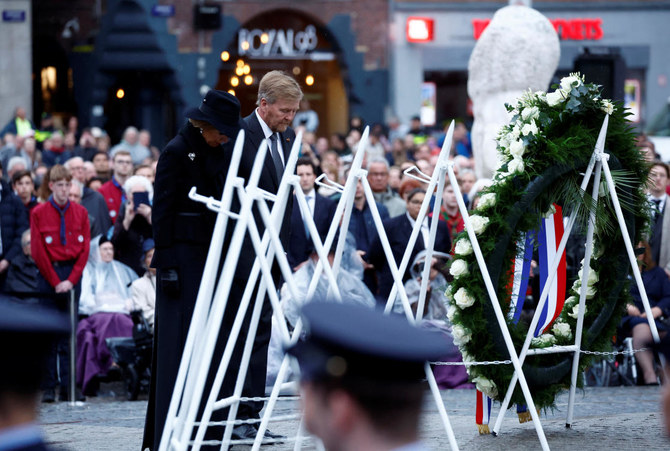
- Normally some 20,000 people attend the Dam commemoration
- Earlier this week municipal authorities announced unprecedented security measures to keep the ceremony safe and avoid possible disruptions linked to the Israel-Hamas war
AMSTERDAM: Dutch King Willem-Alexander and Prime Minister Mark Rutte joined around 4,000 people on Saturday for the country’s annual World War Two remembrance ceremony amid restricted public access and heightened security due to the war in Gaza.
The ceremony on Amsterdam’s central Dam square, with the traditional two minutes of silence at 8 p.m. (1800 GMT) to commemorate the victims of World War Two, passed smoothly despite fears that there might be protests.
Normally some 20,000 people attend the Dam commemoration without having to register. But earlier this week municipal authorities announced unprecedented security measures to keep the ceremony safe and avoid possible disruptions linked to the Israel-Hamas war.
At the opening of a Holocaust Museum in Amsterdam in March, pro-Palestinian protesters opposed to Israel’s military campaign in Gaza set off fireworks and booed Israeli President Isaac Herzog as he arrived on a visit.
Every town and the city in the Netherlands holds its own remembrance ceremony on May 4 and tens of thousands of people attend the events. The Netherlands then marks on May 5 the anniversary of its liberation from Nazi occupation in 1945.
Drone footage shows Ukrainian village battered to ruins as residents flee Russian advance
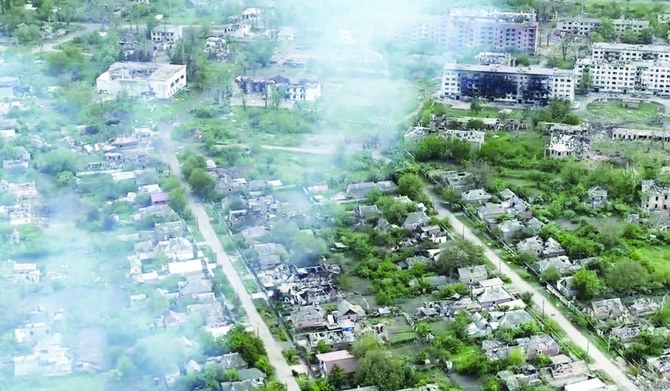
- Residents have scrambled to flee the village, among them a 98-year-old woman who walked almost 10 kilometers (6 miles) alone last week, wearing a pair of slippers and supported by a cane, until she reached Ukrainian front lines
KYIV: The Ukrainian village of Ocheretyne has been battered by fighting, drone footage obtained by The Associated Press shows. The village has been a target for Russian forces in the Donetsk region of eastern Ukraine.
Russian troops have been advancing in the area, pounding Kyiv’s depleted, ammunition-deprived forces with artillery, drones and bombs. Ukraine’s military has acknowledged the Russians have gained a “foothold” in Ocheretyne, which had a population of about 3,000 before the war, but says that fighting continues.
Residents have scrambled to flee the village, among them a 98-year-old woman who walked almost 10 kilometers (6 miles) alone last week, wearing a pair of slippers and supported by a cane, until she reached Ukrainian front lines.
FASTFACT
Ukraine’s military has acknowledged the Russians have gained a “foothold” in Ocheretyne, which had a population of about 3,000 before the war, but says that fighting continues.
Not a single person is seen in the footage, and no building in Ocheretyne appears to have been left untouched by the fighting. Most houses, apartment blocks and other buildings look damaged beyond repair, and many houses have been pummeled into piles of wood and bricks. A factory on the outskirts has also been badly damaged.
The footage also shows smoke billowing from several houses, and fires burning in at least two buildings.
Elsewhere, Russia has in recent weeks stepped up attacks on Kharkiv, Ukraine’s second-largest city, in an attempt to pummel the region’s energy infrastructure and terrorize its 1.3 million residents.
Four people were wounded and a two-story civilian building was damaged and set ablaze overnight after Russian forces struck Kharkiv, in northeastern Ukraine, with exploding drones, regional governor Oleh Syniehubov said Saturday.
The four, including a 13-year-old, were hurt by falling debris, he said on the Telegram messaging app.
Russian state agency RIA reported Saturday reported that Moscow’s forces struck a drone warehouse in Kharkiv that had been used by Ukrainian troops overnight, citing Sergei Lebedev, described as a coordinator of local pro-Moscow guerrillas. His comments could not be independently verified.
Syniehubov said Russia also bombed Kharkiv on Friday, damaging residential buildings and sparking a fire. An 82-year-old woman died and two men were wounded.
Ukraine’s military said Russia launched a total of 13 Shahed drones at the Kharkiv and Dnipropetrovsk regions of eastern Ukraine overnight, all of which were shot down by Ukrainian air defenses.



